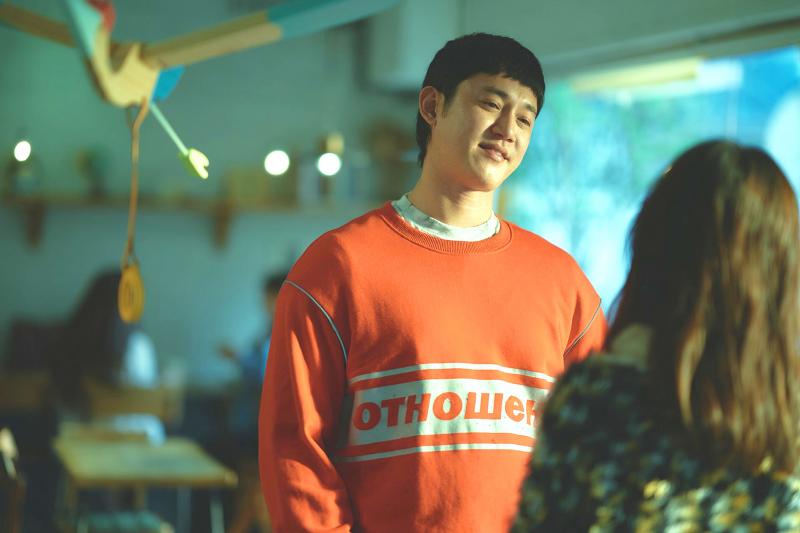Five years prior to the events portrayed in this film, Chin-chin (Eve Ai, 愛怡良) blocked two people on Facebook: Shu-wei (Fu Meng-po, 傅孟柏), her former work crush, and Chih-yang (Chris Wu, 吳慷仁), a self-proclaimed “love expert” and master of breaking up with women.
Since then Chin-chin has buried herself in work, earning the nickname “facial paralysis sister” (面癱姐) by her subordinates for her cold and serious demeanor. But when she is tasked with developing a love-based mobile game, she starts reevaluating her life and relationships. Meanwhile, the eccentric, happy-go-lucky Chih-yang forces himself back into her life. As the story progresses, Chih-yang starts coming to terms with his life choices as well.
It’s a simple, everyday story about facing regrets over missed opportunities, told in a quirky, somewhat disorderly manner. It especially speaks to single office workers in their 30s and 40s who have enough love and career experience but still wonder where life is going without an established path to follow, and perhaps the plot runs all over the place because that’s how it feels to be in that situation.

Photo courtesy of Warner Bros
A more focused, nuanced story would definitely have made the film stronger, but I Missed You still does its job as a feel-good, tear-jerking Lunar New Year plus Valentine’s day holiday flick. The favorable box office sales reflect that.
Despite the intentionally fast-paced and choppy storytelling with parts left to imagination, it’s not too difficult to understand and put the pieces together as the film goes on. The directing duo of Mag Hsu (許譽庭) and Hsu Chih-yen (許智彥), who were nominated for a Golden Horse in 2018 for Dear Ex (誰先愛上他), are wise to not keep this frenetic style up for the entire movie. The style changes pace and becomes more grounded toward the second half.
Although the two leads seem to be complete opposites — Chin-chin is a hard-driving, outspoken corporate team leader in a business suit while Chih-yang is a frivolous, good-for-nothing loafer who wears oversized hip-hop clothing — they hide similar self-loathing and vulnerability.

Photo courtesy of Warner Bros
The two leads do a good job portraying their duality through flashbacks; they were once quite different people than shown in the film, changed greatly by past events. While Wu is a veteran thespian with several major acting accolades, it’s surprising to find Ai, who is a well-known singer-songwriter, taking a lead role here in her acting debut. She also wrote the theme song for the movie.
Popular singer-songwriter 9m88 plays a minor role in the film as one of the young staffers on Ai’s team; her youthful energy and musings of how she wants to be after she turns 30 provides a contrast to Chin-chin’s situation.
There’s no big message, mystery or even a rushing climax in this film. Just don’t block people on social media before facing them first, or at least saying a proper goodbye, otherwise it is hard to move forward. As Chih-yang tells Chin-chin in one scene: “That day, only your pride walked away; you’re still standing on the same spot.” Sometimes the simplest themes hit closest to home.
Finally, if you’re familiar with Taiwanese pop culture, look for all the big-name Easter eggs that are dispersed throughout the movie.

We lay transfixed under our blankets as the silhouettes of manta rays temporarily eclipsed the moon above us, and flickers of shadow at our feet revealed smaller fish darting in and out of the shelter of the sunken ship. Unwilling to close our eyes against this magnificent spectacle, we continued to watch, oohing and aahing, until the darkness and the exhaustion of the day’s events finally caught up with us and we fell into a deep slumber. Falling asleep under 1.5 million gallons of seawater in relative comfort was undoubtedly the highlight of the weekend, but the rest of the tour

Youngdoung Tenzin is living history of modern Tibet. The Chinese government on Dec. 22 last year sanctioned him along with 19 other Canadians who were associated with the Canada Tibet Committee and the Uighur Rights Advocacy Project. A former political chair of the Canadian Tibetan Association of Ontario and community outreach manager for the Canada Tibet Committee, he is now a lecturer and researcher in Environmental Chemistry at the University of Toronto. “I was born into a nomadic Tibetan family in Tibet,” he says. “I came to India in 1999, when I was 11. I even met [His Holiness] the 14th the Dalai

Following the rollercoaster ride of 2025, next year is already shaping up to be dramatic. The ongoing constitutional crises and the nine-in-one local elections are already dominating the landscape. The constitutional crises are the ones to lose sleep over. Though much business is still being conducted, crucial items such as next year’s budget, civil servant pensions and the proposed eight-year NT$1.25 trillion (approx US$40 billion) special defense budget are still being contested. There are, however, two glimmers of hope. One is that the legally contested move by five of the eight grand justices on the Constitutional Court’s ad hoc move

Stepping off the busy through-road at Yongan Market Station, lights flashing, horns honking, I turn down a small side street and into the warm embrace of my favorite hole-in-the-wall gem, the Hoi An Banh Mi shop (越南會安麵包), red flags and yellow lanterns waving outside. “Little sister, we were wondering where you’ve been, we haven’t seen you in ages!” the owners call out with a smile. It’s been seven days. The restaurant is run by Huang Jin-chuan (黃錦泉), who is married to a local, and her little sister Eva, who helps out on weekends, having also moved to New Taipei